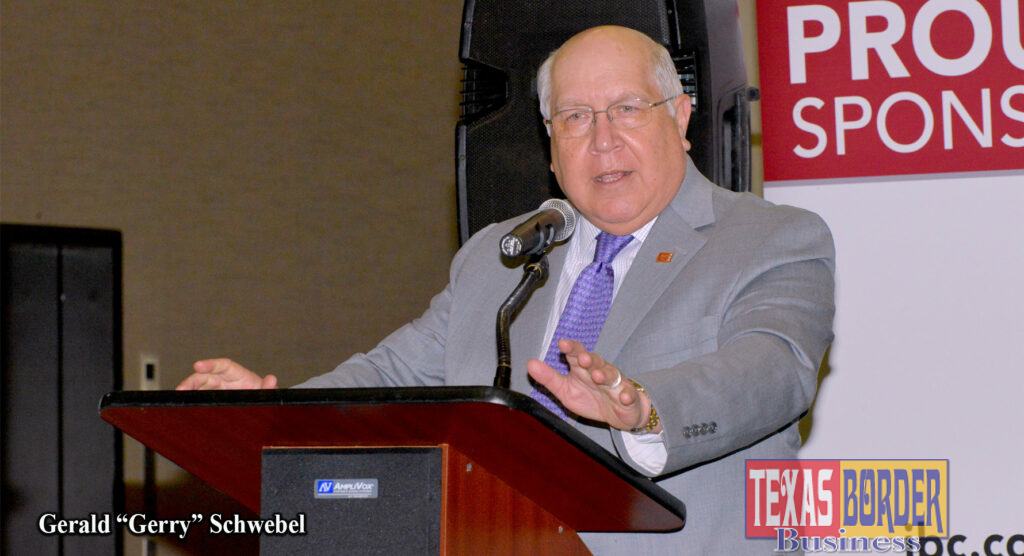He is the Executive Vice President of IBC Bank Laredo

By Roberto Hugo Gonzalez
As originally published by Texas Border Business newsprint edition October 2019
It takes men like Gerald “Gerry” Schwebel to make statements like this; he urged the Congress of the United States to ratify the USMCA agreement, which replaces NAFTA. His comments were made during an event that took place at the International Bank of Commerce (IBC) main facility on south Broadway Street in McAllen. A large group of businesspeople from Mexico and the United States attended and among them were many members of CANACO, the chambers of commerce from all over Mexico.
The new trilateral accord has been ready for a long time. Delays in ratification by the U.S. created uncertainties with our trade partners, also with prospects wanting to be part of commercial trade between the three countries.
IBC Bank has held a long tradition of dedication to the success of its customers. IBC has been involved in support of the fight against cancer, in support of education, and the growth of international trade.
Schwebel is the Executive Vice President of the Corporate International Division at IBC Bank in Laredo, Texas. Schwebel began working at IBC after his service in the United States Army, where he was an artillery officer. He became the head of IBC’s international department in 1996. He frequently represents IBC Bank and the bank’s clients with top government and business leaders in the U.S., Mexico, and Canada. Jerry’s knowledge has led him to serve as an expert providing testimony before Congress on issues regarding U.S. and Mexico trade, including NAFTA, transportation, international finance, and U.S. immigration reform.
His primary leadership positions include being the previous national chairman for the Border Trade Alliance (BTA), the bi-national director of the U.S.-Mexico Chamber of Commerce, a member of the transportation, logistics, and infrastructure committee of the U.S. Chamber of Commerce, a member of the secretary of state’s Border Trade Advisory Council, and an ex-official member of the Texas Freight Mobility Committee.
Schwebel also serves on the executive committee and board of directors for the I-69, and also, as the port advisory committee of Texas. He is the immediate past president of the North American Strategy for Competitiveness.
Just recently, he became involved with the U.S. Chamber of Commerce as a member of the U.S.-Mexico Economic Council. On where we stand with NAFTA, Schwebel is possibly the most qualified individual to speak on the matter with authority. He has attended eight of the private sector NAFTA negotiations held in Mexico City, Washington, Ottawa, and Montreal.
“My objective tonight is to give you an update as a result of the negotiations of the U.S. and Mexico and Canada trade agreement,” he stated.
It is important to note that Schwebel took part in the 1992 and 1993 ratification of NAFTA 1.0; at the time, he was chairman of the board of the Border Trade Alliance. During his participation in these negotiations, by being in the middle of Canadian, Mexican, and U.S. negotiators, he acquired a unique experience. According to Gerry, all of this helps him to understand that these agreements are not perfect, but they’re intended to be better than the prior agreements.
He pointed out that on November 30, 2018, the negotiations ended in the agreement that needs to be ratified. The holdup, he said is the Speaker of the House Nancy Pelosi.
“At the end of the day, this clock will not start ticking to ratification until the drafting and the submission of what they call a statement of administrative action, SAA,” he said.
“What it means,” he explained, “is that the Speaker needs enough votes to have a reasonable debate.” Provided that Congress is not so polarized that we could not have a conversation as to whether this improved agreement will be beneficial or not.”
Besides, he said, “At this point, Mexico has ratified the agreement. Canada is waiting for us to do the same, but time is running out.”
“My point is that the clock will not start ticking until the Speaker and the President, who have not had cordial conversations lately, agree and say, “Let’s go ahead and let the debate begin.”
He said that it will be a 30-day process of debate and hearings. They will each then read into a 15-day additional process of review by the Members of the House, another 15 days by the Senate, and hopefully, a ratification will come out of it.
Schwebel pointed out, there are other issues impacting the relationship, like the tension between the United States and China. “They continue to grow and become tenser. However, we need to have some resolution to the relationship between the United States and China, and also the United States and Mexico.”
As Schwebel was ending his message, he said, “I hope that everyone needs to be involved, not just IBC, because what impacts you, impacts us. And at the end of the day, you need to tell us what’s hurting you. And we can work together and tell the stories in Washington. We’re in support of this agreement, and you should get involved,” he finalized.















